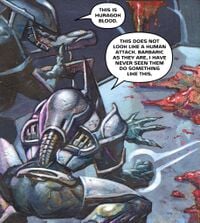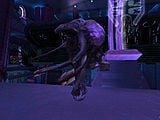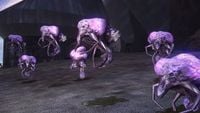Huragok: Difference between revisions
From Halopedia, the Halo wiki
Grubish360 (talk | contribs) |
|||
| Line 70: | Line 70: | ||
===Huragok in Halo 3: ODST=== | ===Huragok in Halo 3: ODST=== | ||
[[File:Huragok Armour.jpg|thumb|right|300px|An armored Huragok in Halo 3: ODST. The armor doubles as a suicide bomb.]] | [[File:Huragok Armour.jpg|thumb|right|300px|An armored Huragok in Halo 3: ODST. The armor doubles as a suicide bomb.]] | ||
While Engineers appear in Halo 3: ODST's campaign, they also have a role in [[Firefight]], where they provide an [[Overshield]] to any Covenant allies within a certain radius around each Huragok. Though two Engineers or more can shield each other, they are still defenseless alone, making it a primary objective to take them out as soon as possible. Engineers are usually attached to a specific Covenant squad or patrol, and tend to completely ignore the battle below them, wandering the area seemingly at random, although they will attempt to move away from danger if they are specifically targeted. | While Engineers appear in Halo 3: ODST's campaign, they also have a role in [[Firefight]], where they provide an [[Overshield]] to any Covenant allies within a certain radius around each Huragok. Though two Engineers or more can shield each other, they are still defenseless alone, making it a primary objective to take them out as soon as possible. Engineers are usually attached to a specific Covenant squad or patrol, and tend to completely ignore the battle below them, wandering the area seemingly at random, although they will attempt to move away from danger if they are specifically targeted. To prevent the incredibly useful Huragok from falling into Human hands, their armour is designed to self-destruct in the event that the entire squad they were attached to is wiped out. They appear in the nighttime versions of the Firefight maps [[Crater (Level)|Crater]] and [[Rally Point (Level)|Rally Point]],<ref>http://xbox360.ign.com/articles/101/1019030p1.html</ref> and they also appear in [[Chasm Ten (Level)|Chasm Ten]]. They're equipped with energy shields.<ref>http://www.gametrailers.com/episode/gametrailers-tv/68&ch=1&sd=0?ep=68&ch=1&sd=0</ref> [[Huragok Recharge Station|Huragok Recharge Stations]] were set up in the flooded areas of the city to house the Huragok work teams. These were destroyed by [[Unnamed Shock Trooper Squad|a squad]] of Orbital Drop Shock Troopers using a captured Phantom and Banshee, likely killing dozens.<ref>''[[Halo 3: ODST]]'', [[Kikowani Station (Level)|Kikiwani Station]]</ref> | ||
==Trivia== | ==Trivia== | ||
Revision as of 03:42, September 29, 2009
Template:Ratings Template:Covenant Species Infobox
- "A sentient labor-saving device with the ability to self-repair and self-replicate. Good with computers."
- — Bungie.net description of Engineers
Huragok (Latin Facticius indoles[1], meaning "artificial genius"[2]), known to Humans as Engineers,[3] are an artificial race that was created by the Forerunners.[1] They are the only known non-combatant race of the Covenant though some are rigged to explode like suicide bombers.
Summary
While the Prophets guide, direct, and manage Forerunner research and technology, it is the Engineers caste who must excavate, unlock, and transport Forerunner artifacts, though the Prophets insist that any admission of that fact is heresy. These remarkably helpful and docile aliens are patient, almost completely silent, and exceedingly reserved in their work and its religious implications. They are called "Huragok" in the Covenant language, and are sometimes referred to as "Engineers" by the Humans.
Engineers are the scientific and engineering backbone of the Covenant and its economy. They float via air sacs, and their many tentacles are able to split into many fine cilia, with which they are able to manipulate machinery. Engineers are capable of quickly learning the functionality of new technology. On one occasion, an Engineer was observed by the Master Chief dismantling a vehicle's engine, assembling it into various other working configurations, and then returning it to its original state, all in a matter of seconds.[4]
Their motivations are unknown; they appear to draw no distinction between friend and foe, preferring to spend their time inspecting or repairing technology, although they will utter a high-pitched keening sound whenever a Forerunner artifact is under any sort of threat. They are extremely apathetic to any sort of combat, and tend to just float along with a single goal: to fix things. In one encounter, an Engineer repaired the Master Chief's damaged shield generator and then floated away; the rather unlucky Engineer was later shot by Lieutenant Haverson to prevent it from possibly giving the specifications of the Chief's improved shield technology to the Covenant.
Their concentration has been described as "a trance-like reverie" by the few who have witnessed it. They usually communicate only with Prophets -- a fact that may contribute to the balance of power between Elites and Prophets -- and will usually ignore anything that is neither a Prophet, a Forerunner artifact, nor a machine.[5] A notable exception is the Huragok Lighter Than Some, who communicated with the Unggoy Deacon Dadab via Huragok sign language.[6]
The abilities of the Huragok are not limited to their skills to fix things; they are also able to absorb data from a computer or an AI, and combine it with their own biological "data". During a mission to recover a living Huragok, Captain Veronica Dare described the species as "biological supercomputers.",[7]
Origins
The Engineers were created by the Forerunners prior to the first activation of the Halo Array.[1] Being mechanical structures rather than true life forms, they survived the activation and were later found by the Prophets in various M-Series facilities.
Anatomy and Physiology
The Engineers are actually not a natural biological species at all, but rather an artificial life form created by the Forerunners. While they possess no true tissues or organs, their nano-mechanical surrogates so closely mimic their biological analogs that they seem almost indistinguishable to later observers.[1] Gas-bladders serve as their method of locomotion, allowing them to float through the air even after their deaths. The bladders also serve as part of their respiratory system; if their gas bladders deflate, they will asphyxiate and die.
They have six dark eyes and four tentacles that can split into very small, near-microscopic cilia. The Engineers use these cilia to construct, repair, or rebuild nearly anything they can grasp. They can take apart whole vehicles and rearrange their entire structure in a matter of seconds, with the resulting machines still operating at least as well as they did before. They learn at an unprecedented rate, and store that information for future reference if ever they need to repair the same thing twice. They are capable of surviving in at least oxygen- and methane-rich environments, though they cannot survive in a vacuum.
Engineers are not normally a tactical threat and are hardly ever seen in combat situations. Unlike the majority of the Covenant races, they do not regard humans as enemies -- during the Master Chief's assault upon Ascendant Justice, one even aided the Chief by repairing the shield generator on his MJOLNIR armor and fixing the Spartan's current weapon, a broken Needler.[8] However, Lieutenant Haverson killed the Engineer stating that it had learned all about the MJOLNIR shield technology, which was superior to the Elite's Personal Energy Shields, and could not be allowed to relay that information. In Halo: Contact Harvest, a Huragok named Lighter Than Some attempted to aid the Humans in an attempt to bring peace; he even made them a peace offering, which against his wishes was converted into the Brute Chopper.
Huragok "reproduce" by gathering the needed (or available) materials from their surroundings to build another Huragok. Up to three Huragok take part in this process, relaying all the information that they have learned to their "offspring." Given sufficient raw materials, a pair of Huragok can produce a unified replica of themselves in approximately 45 minutes; the addition of a third Huragok cuts the time down to 30 minutes. Understandably, it is advantageous to have as many Huragok contribute to this process as possible, raising the "intelligence" of the offspring.
Huragok blood is colored a deep scarlet orange, and looks highly viscous and sticky. Piles of Engineer gore can be seen in the Halo Graphic Novel, whereupon the squad of Elites come across them inside the ship Infinite Succor. However, it is possible that that depiction is not entirely accurate, as the graphic novel took several liberties with appearances.
Though the inner workings of an Engineer's internal macroscopic biology remain a mystery, it is known that they are capable of using the gas sacks that keep them afloat for anaerobic respiration. This method is painful, dangerous, and apparently only used as a last resort. In the Halo series, only one usage of the ability has been described: when, in Halo: Contact Harvest, Lighter Than Some used anaerobic respiration to keep Dadab alive after the latter's methane tank depleted. Huragok use thousands of microscopic organisms to digest the food they consume, producing many gases, including methane, as a by-product.[6]
Communication
Huragok can communicate with other Covenant species, such as Grunts, and perhaps with other Huragok, by flexing their limbs in various directions, bending and overlapping to form the specific formation for each word, much like Human sign language. Their gas sacs can also swell and deflate at times of great emotion, suggesting another, more subtle method of communication. Engineers can also communicate using whistle sounds, as shown in Halo: First Strike, when Cortana uses a Covenant SHIPCOM speakers to verbally communicate with an Engineer. This form of communication is used in Halo Wars; the whistle sounds are how Engineers respond when selected. They can also make deep laughter like sounds while around targets or allies.
Personality
Engineers are an extremely valuable asset to a crew as they enjoy fixing things immensely. In several of the novels, they are described as caring about nothing else. However, in Contact Harvest, it is shown that they are very peace loving and have a great respect for life in general. Lighter than Some even refuses to play a game that would kill non-sentient pests. However, they can be pushed into violence when a friend is in danger, as demonstrated when Lighter than Some saved his friend Dadab by killing a human, Henry Gibson, with a hunting rock.
Appearances
Engineers are seen in Halo: The Fall of Reach, Halo: First Strike, Halo: Ghosts of Onyx, Halo: Contact Harvest, Halo 3: ODST, The Art of Halo and Halo Wars. Initially, Engineers were originally intended to appear in Halo: Combat Evolved, but due to time constraint issues, they were "left on the cutting room floor." They were cut so late, however, that they remained in the Prima Guide for the game, and their files were not deleted entirely from the game -- modders have located the Engineer files on the game disc and spawned Engineers in various configurations, hence the images that may be found.
In Halo: Fall of Reach, an Engineer is observed by the Master Chief dismantling and re-assembling a Human car on Sigma Octanus IV. This was their first, known recorded appearance by the UNSC. This also demonstrated their knowledge of machines, no matter the type.[4] In the Halo Graphic Novel it is noted that some Engineers were stationed on the Infinite Succor. Rtas 'Vadumee noted that the Flood had killed Engineers, smearing their blood onto the floor, which proved that it was not Human forces that had infiltrated the Infinite Succor, but something else. In Halo: First Strike, an Engineer repaired the Master Chief's Needler. Later another one repaired his Energy Shield; this one was fatally shot by Lieutenant Haverson, to avoid the risk of it divulging the MJOLNIR's improved shield design to the Covenant. Haverson appeared to feel some pity for the creature. Due to its mechanical nature, however, it may have simply been repaired by another Engineer. In Halo: Ghost of Onyx, a group of Engineers repaired a NOVA bomb stolen by the Covenant fleet after a Grunt, Kwassass pushed a button. The NOVA bomb was then activated and exploded, destroying the Covenant super-carrier Sublime Transcendence and its entire crew, as well as the nearby Covenant outpost planet Joyous Exultation, its moon, Malhiem, and the rest of the fleet orbiting it.[9] A Huragok, Lighter Than Some, appears in the book Halo: Contact Harvest. He is shown to have a fairly friendly relationship with shipmate Dadab, a Grunt Deacon.
Engineers are also featured in the Bestiarum booklet in the special editions of Halo 3, though they do not appear in that game either.
Huragok in Halo Wars
In Halo Wars, they provide the only means for the Covenant to repair their damaged buildings and vehicles and heal injured units. They are easily slain, as they are unarmed and can only repair other Huragok -- not themselves.If combined with a Scarab and another engineer they will make the scarab almost indestructible. They'll automatically search and find damaged machinery and troops to repair. They have two upgrades:
- "State of Grace": allows Huragok to have faster repair rate.
- "Harmonious Digestion": enhances their movement speed.[10]
They are trained from the Summit, require 250 resources and 0 tech level, and count as 1 population. They somewhat resemble Flood Bomber Forms, though not in size.
Huragok in Halo 3: ODST
While Engineers appear in Halo 3: ODST's campaign, they also have a role in Firefight, where they provide an Overshield to any Covenant allies within a certain radius around each Huragok. Though two Engineers or more can shield each other, they are still defenseless alone, making it a primary objective to take them out as soon as possible. Engineers are usually attached to a specific Covenant squad or patrol, and tend to completely ignore the battle below them, wandering the area seemingly at random, although they will attempt to move away from danger if they are specifically targeted. To prevent the incredibly useful Huragok from falling into Human hands, their armour is designed to self-destruct in the event that the entire squad they were attached to is wiped out. They appear in the nighttime versions of the Firefight maps Crater and Rally Point,[11] and they also appear in Chasm Ten. They're equipped with energy shields.[12] Huragok Recharge Stations were set up in the flooded areas of the city to house the Huragok work teams. These were destroyed by a squad of Orbital Drop Shock Troopers using a captured Phantom and Banshee, likely killing dozens.[13]
Trivia
- Engineers are the only Covenant race to be cut from the original Halo Trilogy yet still considered "canon", as they appear in the novels. They were later included in Halo Wars, and play a major role in Halo 3: ODST.
- Though they were cut from Halo: Combat Evolved, the Huragok went through several development cycles.
- Halo fans first learned of the Huragok from a screenshot in the August 2000 issue of PC Gamer magazine (scanned here).
- If a Huragok is killed after being modded into Halo: Combat Evolved, it will simply remain perfectly still, as it has no death animation. If you shoot it after the blood has spilled from it, the skin of the Huragok will bubble with a purple liquid where you shot it, which shows an element of Halo: Combat Evolved that was never used in the final game - wound graphics.
- Three Huragok were taken prisoner aboard the Ascendant Justice when it was captured by Human survivors of the Battle of Installation 04. One was killed after it learned of Human shield improvements, to prevent its return to the Covenant. The other two were presumably interrogated by ONI. Their current fate remains unknown.[14]
- The Huragok are, ironically given their pacifism, the species credited with killing the first human in the Human-Covenant War, albeit in defence of a friend, Dadab. This particular Huragok was Lighter Than Some, who killed a man on board the ship This End Up by throwing a "hunting rock" at the back of Henry Gibson's head, killing him instantly.
- In Halo 2's Conversations From The Universe they are known to be called "Loogies" or "Boo-Bags" for their appearance.
- Engineers appear in Halo 3: ODST and provide energy shields to near by Covenant and will explode after death.
- Despite the UNSC having been aware of Engineers for quite some time before the events of ODST, upon meeting one face-to-face while looking for Captain Veronica Dare, ODSTs Gunnery Sergeant Edward Buck and Lance Corporal Kojo Agu had clearly never encountered or heard of anything like it.
- The "Good Samaritan" achievement can be unlocked by not killing any Engineers in New Mombasa at night during the entire Campaign, alone or with another ODST. On the other hand, killing all of the Engineers in the city will unlock the "Naughty, Naughty" achievement. [15]
- The Huragok in Halo 3: ODST have two sensors above their heads that have a striking resemblance to the sensors found on the Flood Infection Forms.
- In Halo 3: ODST, several Phantoms are seen carrying Huragok armor plates in interlocked stacks which hang from the bottom.
Gallery
- 1207643494 Engineer front.gif
A frontal view of the cut Huragok.
A group of the concept Engineers from a Halo: Combat Evolved mod of the level The Silent Cartographer.
- HWengineer.jpg
A Huragok as seen in Halo Wars.
- Concept huragok.png
Concept art of an armored Huragok and carrying hooks for Halo 3: ODST.
- 94983734-Full-1-.JPG
A suicide Huragok moments before exploding
Sources
- ^ a b c d Bestiarum
- ^ HBO Forums
- ^ Halo: Ghosts of Onyx, page 237 - "Huragok: the Forerunner name for the Engineer race".
- ^ a b Halo:The Fall of Reach, page 183
- ^ Halo: The Fall of Reach, pages 200, 201
- ^ a b Halo: Contact Harvest
- ^ Halo 3: ODST, Data Hive
- ^ Halo: First Strike, page 83
- ^ Halo: Ghost of Onyx page 236
- ^ http://www.halowars.com/GameInfo/Summit.aspx#Engineer
- ^ http://xbox360.ign.com/articles/101/1019030p1.html
- ^ http://www.gametrailers.com/episode/gametrailers-tv/68&ch=1&sd=0?ep=68&ch=1&sd=0
- ^ Halo 3: ODST, Kikiwani Station
- ^ Halo: First Strike
- ^ Halo 3: ODST Achievements, Good Samaritan and Naughty Naughty


